![]()
MEANING: to give little consideration to
IN CONTEXT: He took a whole week to apologize, so when he did I gave him short shrift and didn’t even respond.
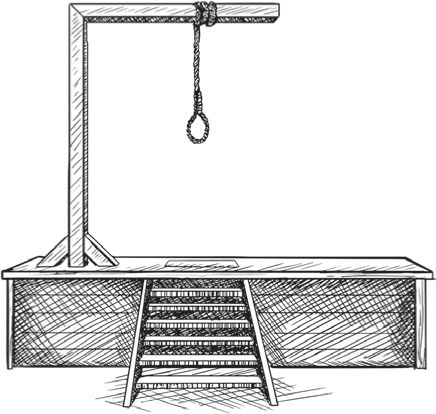
Often mistakenly said as “shift,” short shrift dates from the criminal world of the 17th century. A “shrift” is a confession given to a priest in order to obtain absolution. It comes from the verb shrive, the past tense of which is shrove—Shrove Tuesday is when people go to confession. In the 17th century, as soon as criminals were convicted and sentenced, they were sent to the gallows to be hanged. There was usually a priest waiting with the executioner and the prisoners were allowed a very short time to confess their sins in the last minutes of their life. They were given a short shrift before they were killed.
![]()
MEANING: a deliberate betrayal, usually by a previous partner; a violation of a promise
IN CONTEXT: The two thieves planned to split the money, but one double crossed the other and fled with it all.
There is some conjecture as to the true origins of the expression to double cross. Some say it began with racehorse jockeys who would receive money to lose a race, but then go on to win. They would cross themselves twice as they passed the winning post, as a plea to God to forgive them for their double deception. However, the likely beginnings are from the 18th-century London bounty hunter Jonathan Wild. Wild had a monopoly on crime at the time, famed for operating on both sides of the law. Known as the “Thief-Taker General,” Wild kept meticulous records of all the criminals he did business with, paying for information that advanced his extensive network. If any criminal on the list displeased Wild in any way, he would place a cross next to his name in the book of thieves. A second cross meant that the criminal had outlived his usefulness, and Wild would turn him into the authorities and claim the reward. Wild himself was eventually betrayed and was hanged in 1725. The first written reference to double cross as an expression was by David Garrick in his 1768 play The Irish Widow.
![]()
MEANING: a form of torture ending in death
IN CONTEXT: I’ll be hung, drawn, and quartered if I don’t submit my work on time again.
Hung, drawn, and quartered (technically hanged, drawn, and quartered) was a form of punishment and execution in England from the 13th century until 1870. It was reserved for anyone convicted of treason, and the executions were a popular public spectacle. The process involved hanging the man until he was almost dead, before disemboweling him (known as “drawing”’), then chopping off his head and cutting his torso into four parts. The remains were often displayed in prominent places across the country as a warning to others. Many famous men were victims of this draconian punishment, including the famous traitor, Guy Fawkes, and the Scottish patriot, William Wallace. The expression developed into its present-day figurative use by the 17th century.
![]()
MEANING: by whatever means necessary, fair or unfair
IN CONTEXT: I’m going to get to the train station on time, by hook or by crook.

By hook or by crook originates from medieval England. Hooks and crooks were long-handled tools used by lower class people in the fields. A hook was a blunt device used by a reaper for holding or pulling, and a crook had a bent end and was used by shepherds to tend to sheep. It was law at the time that no trees or branches were allowed to be cut from the royal forests for firewood. However, peasants were allowed to take whatever deadwood they could gather with either a reaper’s billhook or a shepherd’s crook—anything by hook or by crook was permissible.
![]()
MEANING: to be cheated
IN CONTEXT: That car is only worth $10,000. You really got screwed on that deal.
To be screwed derives from a 19th-century form of punishment. At the time, English prisons were notoriously tough, with “hard labor” meaning just that. A common practice to punish inmates was to have them turn a crank handle for hours at a time. This was hard enough work as it was, but it could be made even more difficult by a guard tightening a screw, which increased the resistance of the crank. Any prisoner who was particularly bad or disliked by the prison staff would usually be screwed. This is also the origin of the phrase “to tighten the screw.”
![]()
MEANING: to cheat or deceive someone
IN CONTEXT: I trusted my accountant to invest the money for me, but he took me for a ride and I lost the lot.
Take for a ride originated during the era of Prohibition in America. During the 1920s, criminality was high, with gangs dealing in bootlegging and other illegal activities. Competition for market share was strong and gang warfare was rife. Any rival gang member who displeased another chieftain would commonly be invited by a henchman to go for a ride. The idea was that the men would drive in a car to a secluded place, where they could talk matters over and resolve any differences. But this was usually just a cover, and the victim rarely returned.
![]()
MEANING: an object of ridicule and humiliation
IN CONTEXT: Her constant mistakes at work had made her the laughing stock of the company.
Laughing stock originated from a medieval form of punishment in England. Most villages had stocks set up in the public square. The stocks comprised two sliding boards with holes in them that were secured on a wooden frame. The hands and feet of the victim were placed in the holes, rendering him unable to escape or move freely. Petty criminals were put in the stocks so the town people could gather around, laughing and humiliating the person, even throwing rotten vegetables at them. The phrase laughing stock had developed into its current use by the early 1500s. In Sir Philip Sidney’s 1533 critique An Apology for Poetry, he wrote “Poetry is fallen to be the laughing stock of children.”
![]()
MEANING: to trick or deceive
IN CONTEXT: My lawyer said he’d charge a flat fee, but he pulled the wool over my eyes and ended up charging me for a lot of extras.
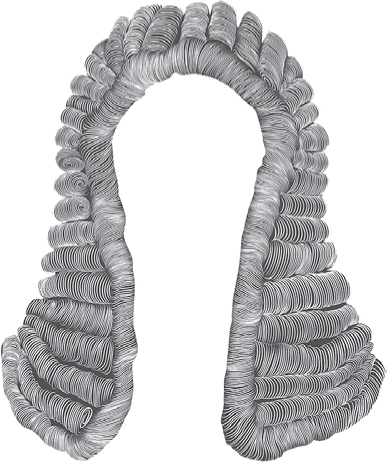
Pull the wool over your eyes relates to the elaborate wigs that people wore in the 17th century. The wigs had a thick, woolly appearance. The social standing of a man was sometimes judged by the size of his wig—the bigger it was, the more wealth the man was thought to have. By wearing large wigs, men were advertising their wealth and became a target for petty criminals. A large wig could also be pulled down more easily. A tactic employed by some criminals was to creep up behind a man and pull the wig down over his eyes. This would temporarily render the victim unable to see, making him easier to rob.
There but for the Grace of God Go I
![]()
MEANING: the acknowledgment of somebody else’s misfortune and suggesting that it could have easily happen to you as well
IN CONTEXT: So many people went bankrupt during the financial crisis that I couldn’t help but think that there but for the grace of God go I.
The expression there but for the grace of God go I is credited to the Protestant preacher and martyr, John Bradford. Queen Mary I’s restoration of the Catholic Church in England saw the persecution of many Protestants. Bradford was one of them, and he was imprisoned in the Tower of London on spurious charges. Each time he saw other prisoners being led off to be executed, he was heard to utter, “There but for the grace of God goes John Bradford.” However, Bradford did not enjoy God’s grace for long, because he was burned at the stake at Smithfield market in London on July 1, 1555. Sir Arthur Conan Doyle used the phrase in his 1891 Sherlock Holmes story “The Boscombe Valley Mystery,” which led to its common usage.
![]()
MEANING: to berate harshly
IN CONTEXT: It was the third time in a week that Lee had been late for work so I really read the riot act to him.
In the 18th century, reading the riot act would literally happen. Instituted in 1715, the Riot Act gave British magistrates the authority to label any group of more than twelve people a threat to the peace. Formally described as “an act for preventing tumults and riotous assemblies, and for the more speedy and effectual punishing of rioters,” a public official would read aloud a section of the Riot Act, which demanded people “immediately disperse themselves, and peaceably to depart to their habitations, or to their lawful business.” Anyone who remained after one hour was subject to removal by force and arrest. The punishments for ignoring the Riot Act were severe—penal servitude for not less than three years, or imprisonment with hard labor for up to two years. The law was put to the test during the infamous Peterloo Massacre in 1819, when a cavalry unit attacked protesters who ignored the reading. But like many other times over history, at the trial the rioters claimed not to have heard the reading because of the loud raucous. The Riot Act remained in effect until 1973.
![]()
MEANING: pay an excessive amount for something
IN CONTEXT: It was peak season at the hotel so we paid through the nose for our room.
Pay through the nose dates all the way back to the 9th century when the Vikings invaded Ireland. The Danish had extraordinarily harsh tax laws, which they imposed on any land they invaded. With the invasion of Ireland, they applied a particularly high tax known as the “Nose Tax.” The punishment for evading the Nose Tax was draconian and perverse. Anyone refusing to pay the tax had their nose slit from tip to eyebrow. The people had a choice: either pay the tax, or pay through the nose.
![]()
MEANING: to go out and celebrate or get drunk
IN CONTEXT: Ed finished his exams today so he’s gone out to paint the town red.
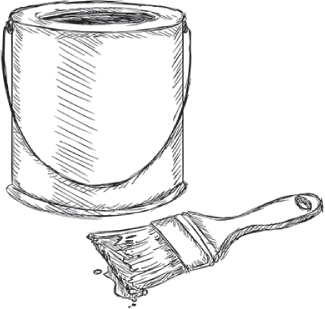
Paint the town red owes its origin to a legendary night of revelry. In 1837, the Marquess of Waterford, known as the “Mad Marquess” because of his erratic behavior, went out with his friends in the English town of Melton Mowbray. The group went berserk on a vandalism spree around the town. They broke windows, pulled off door knockers, and smashed flowerpots. Unsatisfied with that, they acquired some red paint and painted a swan statue, a number of house doors, and even a tollgate. The Marquess later paid compensation for the damage caused, but he had painted the town red and would never live it down.
![]()
MEANING: a rough and useful principle based on experience rather scientific calculation
IN CONTEXT: As a rule of thumb, new plants should be watered daily for the first two weeks.
Rule of thumb has many potential origins. The practice of using the thumb for measurements has existed for centuries—the Romans are said to have used the length from the thumb’s last knuckle to the tip as a measurement for one inch, and before the advent of thermometers, brewmasters would test the temperature of fermenting beer with their thumbs. While the thumb had been used in this way since ancient times, the saying did not get coined until 1782. In that year, Justice Francis Buller of the King’s Bench in England delivered a judgment that formalized the age-old maxim of English law that allowed a man to beat his wife provided that he used a stick no thicker than his thumb. Buller was accused of being prejudiced and was later attacked in a satirical cartoon where he was characterized as “Judge Thumb.” The expression rule of thumb became widespread from that time on.
![]()
MEANING: to severely reprimand someone for something they’ve done
IN CONTEXT: He was late for training three days in a row, so the coach really hauled him over the coals.
To haul someone over the coals originated from the treatment of heretics in the Middle Ages. Heresy is the challenge of the doctrines of an established church, or the practice of unorthodox religions. At that time, heresy was considered a crime against the Church and was punishable by death. However, very few people would admit to it, and the crime was difficult to prove. To combat these evidentiary difficulties, anybody suspected of heresy would be bound and then pulled over a bed of red-hot coals. It was decreed that if the person died, he was obviously a heretic and deserved his fate, but if he survived the torture, God had protected him and he would be set free.
![]()
MEANING: an unrealistic hope or plan; a fantasy
IN CONTEXT: I’d always wanted a house in the Bahamas, but deep down I knew it was just a pipe dream.
Pipe dreams refers to the dreams experienced by the smokers of opium pipes. Opium is a narcotic drug that produces an analgesic and hypnotic effect. The pipe is the device that the opium is placed in and the vapors are inhaled by smoking the pipe. People under the influence of opium often have vivid and fantastic hallucinations. The expression has been used in America since the late 1800s, when opium smoking was legal. The phrase was first written in a figurative sense in a December 1890 edition of The Chicago Daily Tribune referring to man-made flight: “It has been regarded as a pipe dream for a good many years.”
![]()
MEANING: to give someone a chance or special consideration
IN CONTEXT: I was two marks under the grade but the teacher gave me a break and let me pass anyway.
To give someone a break derives from medieval street performers. The acts of these men were usually quite energetic and they were given a break halfway through so that they could pass a hat around and collect money from the crowd for their performance. The expression was then taken up by the criminal world in the 1800s. Whenever a felon was about to be released from prison, his friends would collect money together to give to him so he wouldn’t be penniless. It was said that he was given a break.
![]()
MEANING: thirteen
IN CONTEXT: I like that new bread shop. It always gives you a baker’s dozen.
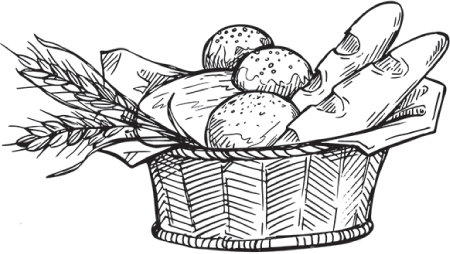
Baker’s dozen dates all the way back to the 13th century. In 1266 England, King Henry III introduced a law that regulated the price of bread based on the price of wheat. One of the reasons for this was to stop bakers from selling underweight loaves, something they were reputed to do. The punishment for breach of the law was harsh and could result in the baker being fined, flogged, or put in the stocks. As a safety measure to avoid the draconian penalties, bakers would give an extra loaf of bread for every dozen. The thirteenth loaf was known as the “vantage loaf.”
![]()
MEANING: deliberately and dispassionately; without emotion
IN CONTEXT: The murderer just walked up and shot the man in cold blood.
Often used in relation to murder, in cold blood dates from the early 18th century. The expression began with the belief that a person’s blood heated up when an act of great emotion or passion was committed. This was based on the reddening of the face and the feeling of heat that a person experienced. It was thought that when one could carry out a violent crime without excitement or emotional involvement, the person was acting in cold blood. The phrase was first recorded in Joseph Addison’s daily English publication The Spectator in 1711, and the word “sangfroid”, meaning “cool and calm,” comes from the French words for “blood” and “cold.”
![]()
MEANING: pointless bureaucratic procedures; excessive regulations
IN CONTEXT: I wanted to get a truck license, but with all the red tape involved it took months.
Red tape is an expression that has been in existence since the 16th century in Britain. Since that time, legal and official documents have been bound with red ribbon. Documents were rolled in their original condition and sealed with red tape. This was done as a measure to ensure documents had not been tampered with, similar to wax seals in ancient times. Official Vatican documents were also bound in red cloth. To this day, many legal documents are bound with pink-or red-colored material. The phrase was changed into its current form by Charles Dickens, who used it to refer to governmental bureaucracies in a number of his books, including David Copperfield in 1849, Bleak House in 1853, and Little Dorrit in 1857.
![]()
MEANING: to toy with; a situation where prey continually escapes its predator but is recaptured
IN CONTEXT: Julie loved to play cat and mouse with an admirer, drawing him in and then being indifferent.

Cat and mouse is an expression that began with the British suffragettes who were fighting for the right to vote at the start of the 20th century. Often when a suffragette was imprisoned, she would go on a hunger strike to draw attention to her cause. Embarrassed by this, the government took to force-feeding the prisoners until a better solution was devised. In 1913 the Prisoners (Temporary Discharge for Ill-Health) Act was passed. This allowed the authorities to detain the women until they became ill. The women were then released to recover, but were too weak to protest. By doing this, the government could claim that any harm that resulted from the starvation was entirely the fault of the suffragette. And as soon as the suffragette recovered and began protesting again, she would be sent back to prison. This piece of legislation became known as the “Cat and Mouse Act,” and from then on the expression was used.
![]()
MEANING: a mock court that disregards due legal process
IN CONTEXT: Instead of being given a fair trial, the foreign drug smuggler was tried in a kangaroo court.
Kangaroo court originated with the California Gold Rush of 1849. Crime at the time was common, and there were many illegal gold prospectors who seized the mining claims of others. They were known as “claim jumpers.” The gold mines had a lawless atmosphere, but informal courts were set up to dispense a rough and ready form of justice to the claim jumpers. There was a large contingent of Australian prospectors seeking their fortune in California, and this, coupled with the reference to “jumping,” gave birth to the naming of the kangaroo court. The term then spread to Britain and was used for any such mock tribunal.
![]()
MEANING: to stall; to be evasive in order to gain time
IN CONTEXT: We intentionally prolonged the negotiations to buy some time while the exchange rate dropped further.
Buying time originated in England in 1797 when the Duties on Clocks and Watches Act was passed. This act, known as the “Clock Tax,” declared that a five-shilling tax would be imposed on every clock or watch in the British Isles. Many clock owners either hid or got rid of their clocks in order to avoid the perverse tax. Sensing an opportunity, tavern owners hung large clocks on their walls, and anyone who wanted to know the time would have to come in. The tavern owners did not mind paying the tax, because people who came in to find out the time were then compelled to purchase a drink. The people would then often stay longer than originally planned, thus they “bought time.”
![]()
MEANING: a shameful secret
IN CONTEXT: Their uncle had once been in jail, which was the family’s only skeleton in the closet.
Skeleton in the closet has its origins in English medical law. Until the introduction of the Anatomy Act in 1832, it was illegal to dissect a human body for medical research. But in contravention of the law, some doctors did still use corpses for both research and teaching. So as to avoid detection, they were known to store the leftover skeletons in their locked closets. The expression was first used in an article by William Thackeray in Punch magazine in 1845 and then in his 1855 book The Newcomes, after which the phrase became commonplace.
![]()
MEANING: to have an issue with someone or something
IN CONTEXT: It was twenty years ago at high school that I stole Graham’s girlfriend, but he still has a beef with me about it.

Have a beef began with the criminal underworld of London in the 18th century. Whenever fellow criminals heard the traditional cry of “stop thief!” in an attempt to help their friend they would loudly yell “hot beef, hot beef.” Known for their cockney rhyming slang, this had the effect of drowning out the original cry and confusing any would-be pursuers, allowing the thief to escape. The term “cry beef” was first defined in the 1811 Dictionary of the Vulgar Tongue as “to give the alarm.” This was later developed into the expression that we use today.
![]()
MEANING: to think seriously about how to solve a problem; to concentrate
IN CONTEXT: We will all need to put our thinking caps on if we’re going to find a way out of this situation.
Put your thinking cap on originated with the judges of the early law courts in England. It was customary at the time for a judge to put on a black cap to show the court that he had heard all the evidence in a criminal trial. The cap was a signal that the judge was ready to deliberate his verdict before passing sentence. Because judges were learned men and respected intellectuals, the cap was referred to as a thinking cap. The expression had taken on its broader meaning by the mid-19th century.
![]()
MEANING: from one place to another
IN CONTEXT: After he joined the army, Joel’s family was moved around the country from pillar to post.
From pillar to post dates back to a brutal form of punishment in medieval England. Each town had a whipping post and a pillory to deal with criminals. Also known as the “stocks,” a pillory was a wooden frame with three holes in it. A criminal’s head and hands would be placed through the holes and the public would gather around throwing rotten vegetables and eggs at the disgraced man. This may last a number of days. The criminal would then be dragged to the whipping post, where he would receive a public flogging. Originally from “pillory to post,” the expression gradually evolved into what we use today.
![]()
MEANING: caught in the act
IN CONTEXT: The criminal was caught red-handed coming out of the store with the diamonds in his pocket.
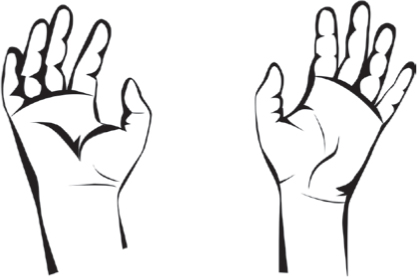
Sometimes said using its Latin equivalent in flagrante delicto, caught red-handed derives from 15th-century Scotland. Legislation existed at that time that referred to “red-hand,” in relation to offenses where the perpetrator was caught in the act. This stemmed from the evidentiary requirement of needing to find actual blood on the hands of anyone accused of poaching. One Scottish legal commentary from 1674 stated, “If he be not taken red-hand, the sheriff cannot proceed against him.” The expression was adapted to being caught red-handed by Sir Walter Scott in his 1819 book Ivanhoe, which popularized the saying.
![]()
MEANING: a story tested and found genuine
IN CONTEXT: Adam said he’d been at the beach, and he did have sand on his feet, so his story rang true.
Commonly said as “the ring of truth,” rings true has its origins with the currency manufacturers of the Middle Ages. At the time, monetary coins were actually made of gold, silver, or other semi-precious metals, with their value depending on the weight of metal they contained. Owing to poor equipment and the scarcity of precious metals, it was difficult to produce coins of a uniform weight and appearance. This provided criminals with an opportunity. They would counterfeit coins by mixing small quantities of gold or silver with a cheaper metal. But when dropped on a stone slab, pure precious metals have a clear sonorous ring, compared with the dull and flat tone of a fake. If someone wanted to test if a coin was genuine, all they had to do was drop it and see if it rang true.